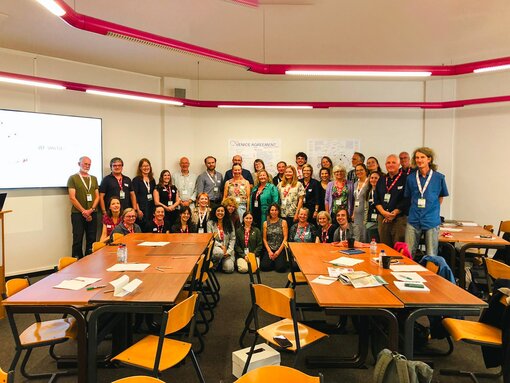The English-speaking workshop at the "Power to the Peatlands" conference in Antwerp on September 19, 2023, kicked off Sensing Peat – an interdisciplinary project that, in the spirit of the Venice Agreement (2022), addresses the culturally and historically shaped artistic narratives and cultural practices surrounding peatlands. Panel host and moderator Jan Peters (Michael Succow Foundation / Greifswald Mire Centre) and Nicole Puschel (Wildlife Conservation Society Chile) impressively described the impetus behind the Venice Agreement: It is a self-initiated and collectively created international agreement that manifests global and local connections, immediate and long-term protection of peatlands, and recognition of artistic, cultural, and ecological values. Its signees form a vibrant international and since then growing community of art, activism, landscape ecology, natural and environmental sciences, land management, restoration, politics, and indigenous studies.
The Sensing Peat project coordinator and visual studies scholar Ulrike Gerhardt (Michael Succow Foundation / Greifswald Mire Centre), active since autumn 2023, pointed the way to the future: In the sense of a neo-materialistic and more-than-human thinking, peatlands will be included in future project activities as active agents and knowledge carriers
that will no longer be regarded as unjustly marginalized and almost forgotten zones of our wounded earth. The other participants of the panel MoseVis (Magni Olsen Kyrkjeeide and Fia Bengtsson), WaterLANDS project (Caitriona Devery and Dr. Shane McGuinness) and RE-PEAT (Bethany Copsey and others) gave an inspiring insight into the versatility and new developments of artistic research-based, activist and cultural-mediated practices in the field of peatland and climate protection.
The unforgettable highlight of the workshop was the collective creative writing session developed by Camila Marambio, curator, peatland advocate and member of the nomadic research collective Ensayos. Using the method of collective imagining and learning, it became clear that aesthetic experiences could be significant keys to peatland restoration: already on site the words, sentences and poetic results of the session directly flowed back into the thought pool of the Venice Agreement, which will continue to evolve like a living ecosystem every two years.
According to the initiators, the newly launched Sensing Peat network aims to bring the principles of the Venice Agreement to life in a sustainable way, to create a platform for interdisciplinary and collective thinking and, last but not least, to make visible and strengthen the link between artistic narratives, peat soils and their plant cultures.
![[Translate to EN:] Banner Stiftung](/fileadmin/_processed_/b/c/csm_banner-stiftung_fee6c1c492.jpg)
